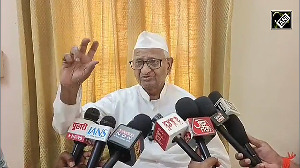In an interesting turn in the case relating to suspended chief justice Iftikhar M Chaudhry, a senior judge of the Pakistan Supreme Court on Thursday questioned the government counsel's claim that President Pervez Musharraf's right to file a reference cannot be challenged in a court.
Justice Khalil-ur-Rehman Ramday, heading the 13-member bench, observed that the presidential reference against Chaudhry did not fall under Article 211 which stipulated that Presidential actions cannot be challenged in any court of law.
Ahmed Raza Kasuri, a government lawyer, said the removal of judges has a long history and the question before the court is whether the reference can be filed against the Chief Justice by the President.
"The question is the maintainability and the competence of the petitions," Ramdey said.
To this, Kasuri replied that the petitions are not maintainable at all. He said that Article 209 of the Constitution falls within the ambit of the jurisdiction of the Supreme Judicial Council.
The government wanted an early end to the case as Chaudhry's suspension ended up creating one of the biggest political crises during Musahrraf's eight years of military rule.
The government's counsel Malik Muhammad Qayyum argued that Chaudhry's petition, which besides questioning the right of Musharraf to file a reference against him as well as the propriety of SJC to conduct trial against the judge, was not maintainable and should be dismissed.
The full bench has already stayed the proceedings of the SJC until the petition is disposed off by the court.
Qayyum said the SJC was a superior constitutional body and as it also issued code of conduct for all judges including those of the Supreme Court, therefore it cannot be considered inferior to Supreme Court, he said.
From the government point view, the SJC headed by Acting Chief Justice was the key as it has the power to conduct trial against the judge in camera and reach a quick verdict.
In his argument, Qayyum contended Article 211 of the Constitution provided blanket cover and does not permit any challenge of proceedings and report of the SJC. Therefore, the composition of the SJC is constitutional and it is a permanent body and all its functions are constitutional.
Referring to Chaudhry's petition which contended that he was restrained by the SJC from functioning as Chief Justice and as a judge of the Supreme Court, Qayyum said that petitions can only be filed under Article 184 (3) of the Constitution if a question of public importance is involved.
He recalled references filed in the past against judges in the country and also referred to process of accountability of judges in other countries. Qayyum said that under the Constitution a person who is chief justice is also a judge.
Members of the bench raised a number of questions about the powers of the SJC and its constitutional status and proceedings. The bench said it admired the counsels of both sides for keeping smooth the proceedings in the case.
Giving arguments on the issue of jurisdiction of the Supreme Court to hear the petitions, Ahmed Raza Kasuri, who is representing the Federation in one petition, said the SJC is a court of law. The composition, powers and proceedings of the Council cannot be challenged in any court of law, including the top court, he said.
Hence the petitions filed by Justice Chaudhry and others challenging the composition and proceedings of the SJC are not maintainable, he contended.
After the arguments the hearing of the petition was adjourned till Monday.
Members of the bench decided to hold the hearing four days a week, from Monday to Thursday, with the concurrence of counsels of the petitioners and the respondents.






 © 2025
© 2025